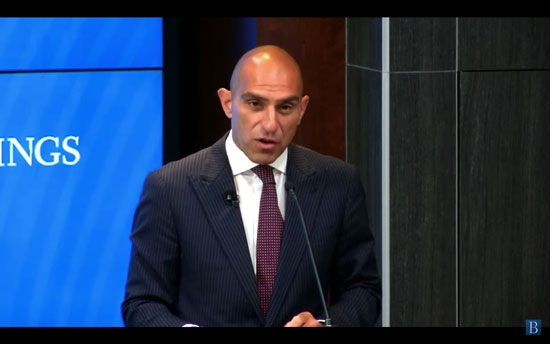This afternoon, Commodity Futures Trading Commission (CFTC) Chair Rostin Behnam participated in a webinar with think tank Brookings Institution titled, “The future of crypto regulation.”
Chair Behnam began with a speech making clear his belief that the CFTC is ready to regulate the cryptocurrency space.
“Regulators must be nimble, and new challenges may require us to dig deeper, take a different look into how our organic statutes promote our growth alongside the markets we regulate. In the absence of new legislative authority, we at the CFTC continue to look at how we can work to protect markets and investors within the bounds of our existing authority. We have (and will forcefully utilize) our fraud and manipulation enforcement authority. But, given the regulatory vacuum, we are also thinking creatively about how else we can use our existing regulatory authority to protect retail commodity markets and investors. Make no mistake: we will use all levers at our disposal, and all relevant authorities to continue rooting out fraud and manipulation.”
Read entire speech here (PDF).
Two main updates included elevating the importance of LabCFTC:
“LabCFTC is evolving in new ways and will take on a new identity as the Office of Technology Innovation (OTI) with an updated operating model. There is now a real intersection between the financial innovations and our markets that did not exist even a few years ago when former Chairman Giancarlo ambitiously and appropriately established LabCFTC as a means to accelerate CFTC engagement with fintech innovators. As I testified in February, we are past the incubator stage, and digital assets and decentralized financial technologies have outgrown their sandboxes (…) OTI will also have an opportunity to evolve within its new structure and have flexibility to meet needs both internally at the Commission and externally in the regulatory space and in the markets.”
And the second update appears to align with education and consumer protection:
“Another change we are making is the realignment of the Office of Customer Education and Outreach within the Office of Public Affairs. This strategic alignment will leverage resources and a broader understanding of the issues facing the general public towards addressing the most critical needs in the most vulnerable communities.”
After the speech, Brookings’ Aaron Klein moderated a discussion with Chair Behnam after the speech. Among the highlights:
On crypto legislation Chair Behnam “likes”
“From a CFTC standpoint, and speaking for myself only, we need clear market oversight over digital commodity assets. And right now, I mentioned 50 some odd enforcement cases, every single one of those cases has been driven by a tip or whistleblower. externally. We don’t have traditional market surveillance or market oversight authority (…) Everything that we do now in traditional derivatives markets we can be doing in the crypto space, and I think it would benefit customers and bring transparency to the market.”
On who should regulate spot crypto exchanges
“I have said this many times that we have to work with our partners at the SEC and with support and help and guidance from Congress, figure out how we decide which tokens are securities, which tokens are commodities, and regulate each, respectively.”
On CFTC versus SEC jurisdiction in crypto
“We’d like to see law drawing lines and then I do think there’s certainly a role for the regulator at that point. -for us, to more clearly define which coins constitute securities and which constitute commodities.”
In the audience Q&A, Chair Behnam would not comment on the SEC’s enforcement of insider trading against Coinbase employee but he did offer his thoughts on stablecoins saying that he views stablecoins best viewed in the “prudential” banking system. On financial stability, he admitted the crypto space is opaque today and that more transparency is needed on how it bleeds into traditional assets and investments. He wants to do as much as they can now to regulate the space before it gets bigger. “It is textbook what happened to a few of those stablecoins and funds that failed,” noting the need for strong regulation.
In answer to an audience member’s question on consumer protection who posited that the CFTC is making a cultural shift from regulating institutions to helping retail with investor protections, Chair Behnam did not take the bait. He said that the transparency required in crypto is no different than the transparency required in today’s more traditional institutional markets that his agency regulates. Nevertheless, this is a key difference in perceptions between the SEC and CFTC – CFTC is not known for retail investor protections.

